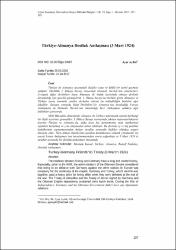| dc.contributor.author | AYDIN, Ayşe | |
| dc.date.accessioned | 2019-05-10T06:37:49Z | |
| dc.date.available | 2019-05-10T06:37:49Z | |
| dc.date.issued | 2017-06 | |
| dc.identifier.citation | | en_US |
| dc.identifier.uri | https://sbd.aku.edu.tr/wp-content/uploads/2017/06/b6aaydin.pdf | |
| dc.identifier.uri | http://hdl.handle.net/11630/5741 | |
| dc.description | The relations between Turkey and Germany have a long and rooted history.
Especially, prior to the WWI, the administrators of the Ottoman Empire considered
that being in an alliance with Germany against the other nations in Europe was
necessary for the continuity of the empire. Germany and Turkey, which went to war
together, paid a heavy price for being allies when they were defeated at the end of
the war. The Treaty of Versailles and the Treaty of Sevres signed by Germany and
the Ottoman Empire respectively contained some harsh terms. During the War of
Independence, Germany and the Ottoman Government didn’t have any diplomatic
relations Following the WWI, republican regimes were established instead of the
fallen empires and new constitutions were adopted, which had never been attempted
before in Germany and the Ottoman Empire. During this period, relations between
the two nations were rare due to the fact that both countries were dealing with the
determination of national and foreign policy objectives. The attempts to restore the
relations between Turkey and Germany intensified after the Treaty of Lausanne and
a treaty of amity was signed between the two parties on 3 March, 1924 | en_US |
| dc.description.abstract | Türkiye ile Almanya arasındaki ilişkiler uzun ve köklü bir tarihî geçmişe
sahiptir. Özellikle I. Dünya Savaşı öncesinde Osmanlı Devleti’nin yöneticileri,
Avrupalı diğer devletlere karşı Almanya ile ittifak içerisinde olmayı devletin
devamlılığı için gerekli görmüşlerdi. I. Dünya Savaşı’na birlikte giren Almanya ve
Türkiye savaş sonunda yenilen devletler olarak bu müttefikliğin bedelini ağır
ödediler. Savaşın sonunda İtilaf Devletleri’yle Almanya’nın imzaladığı Versay
Antlaşması ile Osmanlı Devleti’nin imzaladığı Sevr Antlaşması oldukça ağır
hükümler içeriyordu.
Millî Mücadele döneminde Almanya ile Türkiye diplomatik olarak herhangi
bir ilişki içerisine girmediler. I. Dünya Savaşı sonrasında yıkılan imparatorlukların
üzerine Türkiye ve Almanya’da, daha önce hiç denenmemiş olan cumhuriyet
rejimleri kurulmuş ve yeni anayasalar kabul edilmişti. Bu devrede iç ve dış politika
hedeflerinin saptanmasından dolayı taraflar arasında ilişkiler oldukça asgari
düzeyde oldu. Türk-Alman ilişkilerinin yeniden kurulmasına yönelik çalışmalar ise
ancak Lozan Antlaşması’nın imzalanmasından sonra yoğunlaştı ve 3 Mart 1924’te
taraflar arasında bir dostluk antlaşması imzalandı. | en_US |
| dc.language.iso | tur | en_US |
| dc.identifier.doi | 10.5578/jss.54087 | en_US |
| dc.rights | info:eu-repo/semantics/openAccess | en_US |
| dc.subject | Mustafa Kemal, Türkiye, Almanya, Rudolf Nadolny, Dostluk Antlaşması | en_US |
| dc.title | Türkiye-Almanya Dostluk Antlaşması (3 Mart 1924) | en_US |
| dc.title.alternative | Turkey-Germany Friendship Treaty (3 March 1924) | en_US |
| dc.type | article | en_US |
| dc.relation.journal | Sosyal Bilimler Dergisi | en_US |
| dc.department | Afyon Kocatepe Üniversitesi | en_US |
| dc.identifier.volume | 19 | en_US |
| dc.identifier.startpage | 107 | en_US |
| dc.identifier.endpage | 121 | en_US |
| dc.identifier.issue | 1 | en_US |
| dc.relation.publicationcategory | Makale - Uluslararası Hakemli Dergi - Kurum Yayını | en_US |



















